I’ll admit that I have a propensity for coming up with post names that rhyme. Naming these posts, especially when I write them more frequently, is the toughest part of keeping a blog; naming things never comes easily for me. When I was a kid, my dad pointed out that I didn’t need to keep naming documents File_01.txt, Home_Pic_02.jpg, etc; that “we live in an era in which we can have longer than 8 character filenames.” I’ve gotten a little bit better, but I still order folders by date and one-word topic summary on all my computers. This comes from being an obsessive-compulsive organizer; my future children will be named Boy_01 and Boy_02 for simplicity’s sake.
One of the many advantages of working at a vocational training school is that you’re surrounded by professionals who are experts in their respective fields. As a teacher, I not only allow but encourage my students and other people at the campus to bring their personal computer to me for us to work on in class. Philip and I got a free TV that was found on the side of the road and Hattam, our electronics teacher, replaced its burnt-out power supply. Nicholas gives us free vegetables from the gardens he teaches in. It’s a good system.
Yesterday I reaped the benefits of vocational trainers yet again when the plumbing instructor, Nahzeeh offered to finally install one of the last major necessities to our house’s upper floor – the kitchen sink. Nahzeeh prefers to be called Abu Eid, the Arabic kunya, which literally means “Father of Eid.” It’s a very common practice for a man to take the name of his firstborn son and everyone including Khalil and Wajih do it. Abu Eid took care of all of the part procurement for Galen and I, all we had to do was pay him for the parts and he’d do everything else. The whole process took about 3 hours, which included building a metal frame to house the sink, installation, and then adding in the plumbing work.
The metal frame took the most time to complete because there were some problems with the load-bearing metal bars Abu Eid was bolting together. Their sharp edges cut his hands open several times. I’d be helping him hold a piece of metal, then he’d pause and stare at his fingers curiously as he started dripping blood on the floor. “Uh, can I get you a bandaide there, Abu Eid?” I’d ask him. “No problem!” he replied cheerfully for the first few times, but at my insistence, he finally gave in and bandaged his fingers. I couldn’t shake the image of having to drive a bleeding, cheerfully smiling Abu Eid the hospital in a manual transmission car that I neither know how to drive nor am legally allowed to in Jordan. I asked him skeptically whether we could do anything about these knife-like edges on the bars, and he told me he’d bring over some rubber sheeting to cover them up to prevent our ankles from looking like his hands.
After we mounted the aluminum sinktop over the frame, I cautiously tested its strength, causing it to sag like an old man falling over against the wall. Abu Eid slapped me on the back cheerfully and told me it would be fine once we had bolted it to the wall. I had new images in my mind of having to drive the maid to the hospital after the sink collapsed and crushed her feet as she did the dishes. Abu Eid, seeing my hesitation, offered me his falafal sandwich, which did make me feel a little bit more confident about things (and less hungry). He drilled holes in the wall to screw the frame into, and sure enough, the sink felt perfectly sturdy like the one downstairs. He’s the ma’lim, after all, I shouldn’t have worried!
In another ten minutes, he had the pipes hooked into the bottom of the sink, and with a flourish, he motioned for me to test the line. A rush of brown water spat from the faucet, as Abu Eid had expected – he calmly removed the nozzle, banged it against the top of the sink a few times, and the clog and color problems were solved. For the amount of the sand in this part of the world, a proportionally small part of it gets into our pipes. Regardless; there’s a reason why most people, including myself, drink bottled water here. I never would pay $1.25 for it in America, but I will happily pay 40 geruush for a 2 liter jug of it here.
Later last night, I went out with Manal, a friend from choir, and some of her friends to a seafood restaurant down in Wust al-Bellad, the city center, although the name literally translates to “Middle of the Country.” I told her that I didn’t really like seafood, and she assured me that she was the same, until she ate at Auberge. The restaurant, like most in Amman, is dim, filled with thick argeillah smoke, and packed with people. I had barely taken my seat before Manal and her friend Reem led me back outside onto the street and down a narrow alleyway to – a fish shop? They explained that the restaurant owner lets other people serve their food in the restaurant, but you just need to go out and order it yourself. Massive fish, each weighing several kilos and ranging in color from yellow to red to black, stared at me with blank, dead eyes from their ice beds. Reem and Manal haggled with the proprietor, speaking too quickly for me to understand, and then ordered some falafal from another stand nearby. The employee, a young Egyptian guy, flirted with the two girls and gave them extra falafal “for being so pretty,” I purposefully stayed out of the way so as to not impede his generosity.
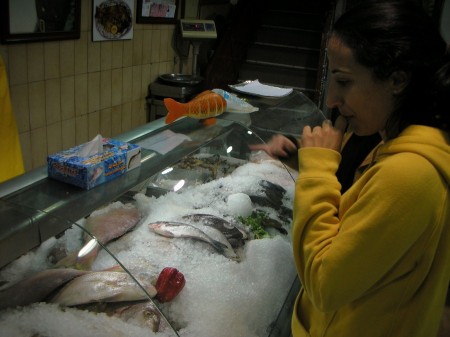
"Should we get the one with 2 cm eyes or 4 cm eyes?" No matter what the kind, fish taste better than they look.
The fish took almost an hour to arrive, but perfection takes time. When the massive trays were carried into the building, I saw that they hadn’t just ordered a massive fish, but also a plate of spiced shrimp and what looked like little rubber gaskets. I asked what they were, and was told that they were squid. Having never had squid before, I was a little suspicious of things that looked like they should be in Abu Eid’s toolbox, but found them quite tasty. “This is great!” I told the table. “So these things are the suction cups then?” This was met with odd stares, “No, it’s just pieces of the squid cut into cross-sections.” Way to be worldly and sophisticated, Zach. One of the other dinner guests with us, a young doctor, used his surgery skills on the fish in front of us, and cut out its spinal cord and held it up for us to see – it was about a foot long in length and each rib spar was as thick as your little finger. What a beast!
As today is Friday, it meant that I’d finally have a chance to go biking with Cycling Jordan for the first time in 3 weeks, since the first half of the month was completely consumed with choir practice. The original plan was for our advanced group to check out the Azraq Nature Reserve in the Eastern Desert, but due to the high winds and dust storms that have been cycloning through Jordan for the past week, we had to reschedule that trip for another time. This kind of weather, called “Khamseen” – the Arabic word for “fifty” which is a reference to the average number of days the weather patterns last – can be spectacular to watch, but not so fun to be trapped in. Just the other day I was walking down the street near home, and the light drizzle of rain that came out of nowhere caught the fine blowing sand made it look like the road was steaming – very cool. In Ayn al Basha, the ground is much more dusty and large cyclones can spin through the campus, making the windows rattle and making the room too dusty to breath. However, it’s already getting hot enough that leaving the windows closed can make working in a classroom for 5 hours intolerable. I can only imagine what it’ll be like in July: heatstroke, here we come.
Anyway, so instead of the reserve, Sa’ad lead our advanced group out to the west through Wadi Seer. Like so many places outside of the drab buildings of Amman, the Wadi is lovely, a green trench carved through the brown desert that culminates in one of Jordan’s numerous water reservoirs. Although I’d heard of the Wadi before, and heard it announced on buses, I didn’t know that it was as easy to get to as just continuing to go west after the 8th Circle and only a few minutes after the police station faded behind us, we were suddenly balancing on the edge of a huge gorge. Wadis tend to sneak up on you like that; one minute you’re in the crowded streets of Amman and then suddenly you’re overlooking a cliff.
The highlight of the trip (although the other 12 bikers may disagree with me) was going straight up the slope of the Wadi onto its opposite side. Heiko groaned when we turned towards it and told me, “This is the worst mountain in the world.” This coming from a skilled German outdoorsman should have worried me a little, but the thin air perhaps was preventing me from thinking clearly. We stopped for a photo op at the bottom of the hill, and some police officers pulled up behind us and asked Sa’ad what we were doing. He explained that we were going up the cliff, and they laughed. It wasn’t a mean laugh, not really, but more like a laugh of, “boy, bike riders sure do have a few screws loose.” Sa’ad had requested that I follow behind and make sure everyone was doing okay, so I waited and took a few pictures, commenting to the officers that it looked beautiful from here, “schikillu jameela min hawn” – they laughed at this and one of the called, “ANTA jameel!” – you’re the beautiful one. I laughed at this and replied, “3lla takeeahti” – literally, upon my hat. A common Arabic expression of gratitude for a compliment is “3lla rassi” – upon my head. But since I was wearing my helmet, the joke was not lost to the officers who roared with laughter at this.
Then it was time for the hill itself, and Heiko wasn’t kidding – this was a rough hill. Although all of us are experienced, tough riders, 12 of the 13 had to end up getting of their bikes and walking them up the slope to the top. This was a hill so steep that I’m sure that not every car has been able to get up it either. I made it about 20 meters up the slope before I finally dropped off the side, exhausted. But I made up my time behind everyone by jogging it, half-carrying the lightweight aluminum frame. For 10 minutes, the only sounds in the hill were the chirping of birds, the yelling of some donkeys eating somewhere in the bushes, and our panting. The view was exquisite, even halfway up. At the top, Kamal had collapsed in a heap – I remembered what he had said during the Dead 2 Red about having to lug around your muscles everywhere, and realized that I was quite happy to be of the lightweight, spindly variety. Less wind resistance!
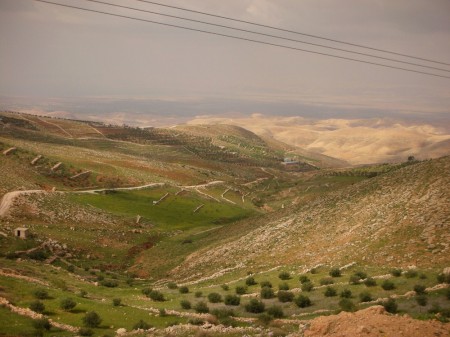
On the other side of Wadi Seer, stone walls line the hills as Palestine stretches away into the horizon
From that point on, the trip was offroad – unpaved gravel with small boulders. There weren’t any more uphills like that first one from then on, but the constant downhills on gravel were pretty exhilarating/terrifying. Thankfully, Sa’ad just got a truckload of new Trek bikes in last week, and the advanced riders were taking them all out for a spin. There wasn’t a single flat tire or broken chain among us; a first for one of our advanced rides. With the exception of the mountain donkeys and a few random Bedouin huts in the cliffs, there was no sign of habitation out here until we reached the reservoir and dam. By this point, the group had separated into two distinct units – the main group, and myself with Sa’ad’s son and a few others. We almost would have gotten lost at the reservoir, but I was keeping in constant contact with Sa’ad to make sure we were on the right path. There were many more people here at the water, fishing, picnicking, and just enjoying the tranquility, than there had been on the entire rest of the path so far.
We rendevoused with the rest of the group after the dam, and suddenly found ourselves back in Shoona, only a few kilometers from the farmhouse. I didn’t recognize the area exactly, but after the dam the vegetation changed abruptly like a switch had been flipped – before, the brush had been dry, stubbly, and sparse, but now we entered the rainforest-like climate that I’ve come to associate with the farm and Shoona, with towering palm trees, bananas, and brightly colored flowers. The khamseen weather had followed us back down in the valley, and at some points, it felt to me like pushing the pedals was harder on the flat roads than they had been going up the wadi cliff!
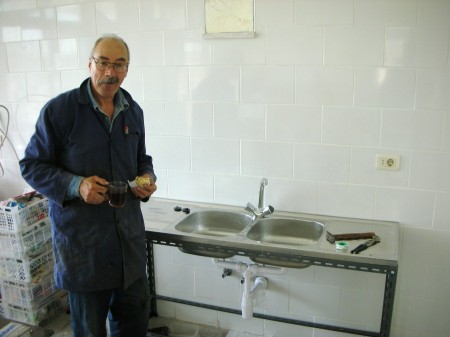
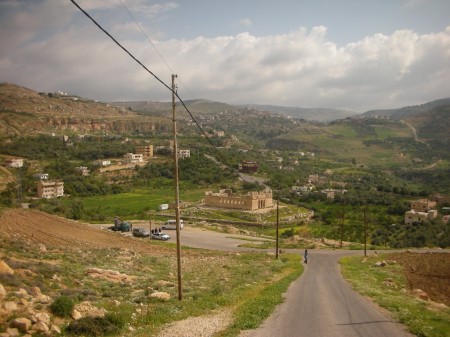
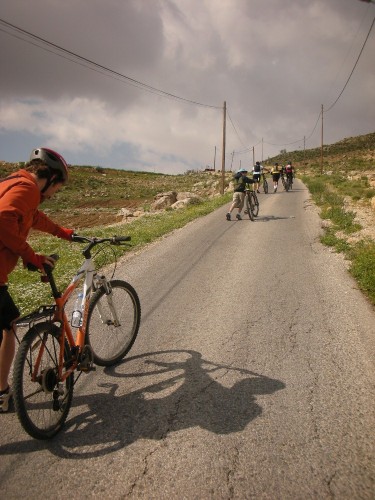


When did you take that pic? I guess i was concentrating on what fish we should have 😛 I’m glad you enjoyed it! 🙂
Not to quibble, but the juxtapostion of intial consonant sounds is alliteration, not rhyming. An eclectic mix of topics, to be sure! Did you decide that the fish you ate (while “tasting better than it looked”) actually tasted good? You also didn’t say who actually made it to the top of the killer incline still on his bike, but I’m guessing it had to have been Kamal, the only guy to ride the entire Dead2Red on a mountain bike!
Yes, I had even emailed TJ about it too because I couldn’t remember the proper word to use, but he didn’t get back to me before I wanted to publish the entry, because I didn’t want to be late and lazy like I was for the last entry!
And no, it wasn’t Kamal, it was a Swiss guy that I hadn’t met before. And yes, the fish was good. The squid, however, was amazing.
yum